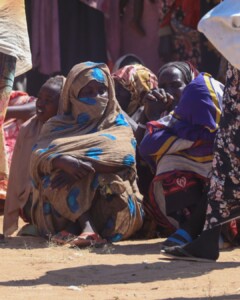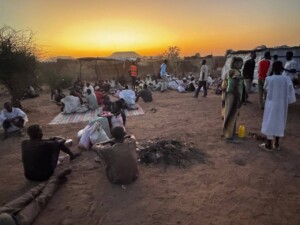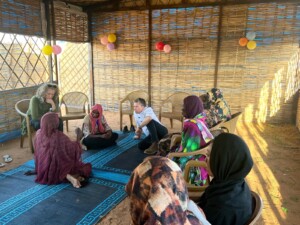Sudan’s COVID-19 pandemic in cartoons by Omar Dafallah
From the first COVID-19 outbreak to the third wave and the vaccine roll-out, Radio Dabanga presents you with a visual retrospective of Sudan’s struggle with the pandemic so far, featuring a series from the sharp-witted and often barbed pen of Sudanese veteran cartoonist Omar Dafallah.
 COVID-19 rolling the world to its grave - Cartoon by Omar Dafallah (RD)
COVID-19 rolling the world to its grave - Cartoon by Omar Dafallah (RD)
The COVID-19 pandemic has affected the entire world and brought societies to a standstill as the virus spread across the globe, but vaccines and testing resources have not been spread out as equally. From the first outbreak to the third wave and the vaccine roll-out, the sharp-witted and often barbed pen of Radio Dabanga's resident cartoonist, Omar Dafallah, has documented not only Sudan's struggle with COVID-19 so far, but also clearly reflected on the pandemic and the world's response in a global context.
The start of the pandemic
The first case of COVID-19 was confirmed in Sudan in March 2020, when a man in his 50s died in a Khartoum hospital. Around the same time, Sudan suspended flights from COVID-19 hotspots and closed all crossing points between Sudan and Egypt. Not long after, Sudan declared a health emergency to combat the spread of the virus.

– Cartoon by Omar Dafallah (RD)
Curbing the spread
As more cases were discovered, Sudan warned about the spread of the virus from abroad. On April 5, Sudan closed its border with Egypt again. Later that month, the government decided on a lockdown.

– Cartoon by Omar Dafallah (RD)
Global epidemic
Around the same time, the scale of the spread in other countries became clear. Europe and the USA were facing a huge surge in cases and the first wave of COVID-19 in the West became a fact.

– Cartoon by Omar Dafallah (RD)

– Cartoon by Omar Dafallah (RD)
Shortages and measures
Before long, Sudan was also struggling to keep the virus at bay. Despite the lockdown, registered cases doubled in two weeks in May and medics called for more protection. People in isolation centres complained about the lack of essential basics, such as clean drinking water.
Sovereignty Council member and Deputy Chairman of the High Committee for Health Emergencies Siddig Tawir complained that Sudan “lacks a supportive community culture to deal with the coronavirus pandemic”. A woman activist organised a COVID-19 awareness campaign in the camps for the displaced.
In July and August, Sudan finally eased its lockdown but not long after, cases were on the rise again. A curfew remained in place but this was largely ignored. The rise in cases raised many concerns about the impact of the pandemic on Sudan's underfunded and already over-extended healthcare services.

– Cartoon by Omar Dafallah (RD)
Second wave
In November 2020 it became clear that Sudan, like so many other countries, was facing a second wave of COVID-19 infections. The public was urged to observe COVID-19 precautions as the death toll rose again. In the meantime, Sudan faced a surge in violence in Darfur.

– Cartoon by Omar Dafallah (RD)
In December, a study found that only 2% of COVID-19 deaths were actually recorded as such in Khartoum, indicating that most of the pandemic went unrecorded and cases were probably much higher than the official records could show.
Vaccines
Around the end of 2020, COVID-19 vaccine programmes were rolled out globally. Sudan also planned to distribute the first doses of the vaccine in the first quarter of 2021, hoping to make 2021 an easier year.

– Cartoon by Omar Dafallah (RD)

– Cartoon by Omar Dafallah (RD)
New variants, new problems
Global hopes that vaccines will deliver a quick end to the pandemic became a distant reality as new variants of the virus emerged and vaccines were distributed unequally. At the start of the year, cases rise 'dangerously' and doctors warn about the lack of resources. Sudan is provided with its first vaccine doses but various officials announced that plans for the roll-out of vaccines across the African continent will take “weeks if not months” to crystallise.

as the Alpha variant emerged in Kent
– Cartoon by Omar Dafallah (RD)

African countries struggled to obtain enough doses of the vaccine,
leaving them vulnerable to further spread of the virus
– Cartoon by Omar Dafallah (RD)

– Cartoon by Omar Dafallah (RD)
More variants, more concerns
In spring, Sudan suspended flights from India and monitored cases from the country as another variant, the Delta variant, raised global concerns. As cases rise everywhere due to this highly contagious variant, the global vaccine roll-out becomes a race against the clock. At the G7 in Cornwall, world leaders pledged to provide more vaccines to poorer countries in an attempt to combat the pandemic
Though the COVID-19 Delta variant is rapidly spreading in the world, its existence in Sudan has not been confirmed yet, Doctor Mohamed El Hafes Khidir, Director of the Epidemics Control Administration, said at the end of July.

– Cartoon by Omar Dafallah (RD)

– Cartoon by Omar Dafallah (RD)
Vaccines vs fake news
In July, Sovereignty Council member and alternate Chair of the Supreme Committee for Health Emergencies Prof Siddig Tawir called on media to "quell false vaccine rumours" and warned against “deliberate misinformation spread by some circles” on the COVID-19 pandemic. USA-based NGO Internews published a community feedback report on COVID-19 information and rumours in Sudan.
According to Internews, most rumours (52%) were related to possible treatments or cures for COVID-19 infections: “Herbal remedies and other readily available treatments in the six states are considered the best alternatives for treating COVID-19 or other medical conditions, since […] healthcare facilities are limited or unavailable in conflict-affected and rural areas”.

– Cartoon by Omar Dafallah (RD)

– Cartoon by Omar Dafallah (RD)
Third wave and the future
At the moment, COVID-19 cases are on the rise in Sudan with over 30 deaths a day in Port Sudan only. Medical sources told Radio Dabanga the Delta variant (aka the Indian strain) is spreading in Port Sudan, however Minister of Health, Dr Omar El Najeeb denied the existence of evidence confirming this.
The World Health Organisation has made a new appeal for vaccines for Africa, saying a “fast-surging” third wave of Covid-19 is outpacing efforts to protect populations, “leaving more and more dangerously exposed”, according to a report in The Guardian.

without spectators Cartoon by Omar Dafallah (RD)

– Cartoon by Omar Dafallah (RD)











 and then
and then